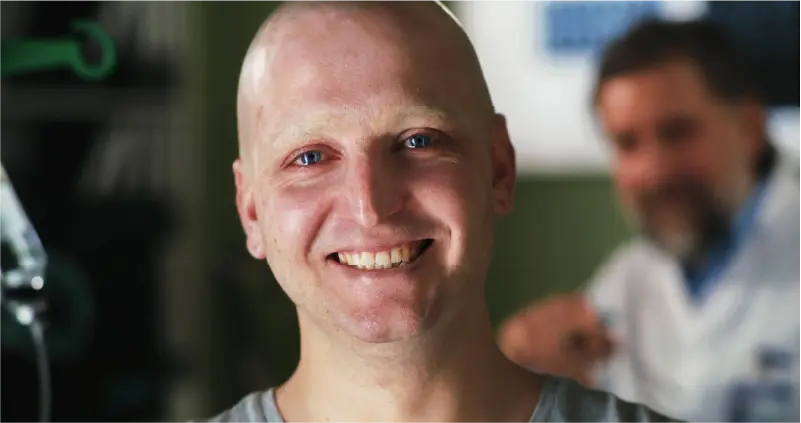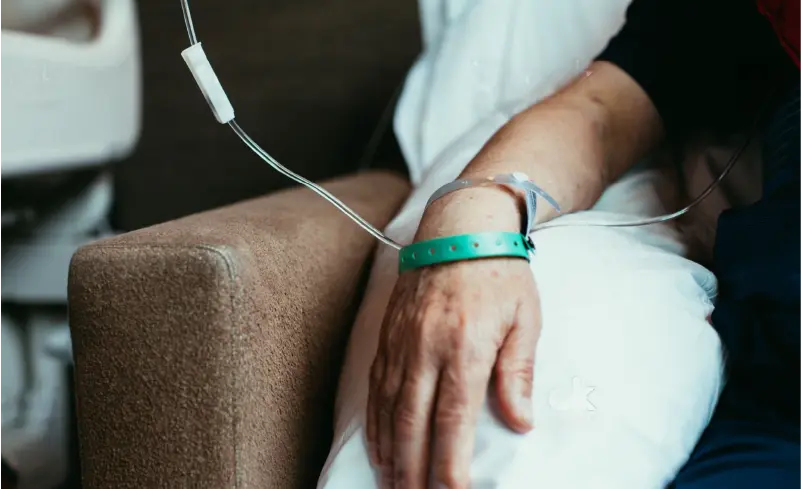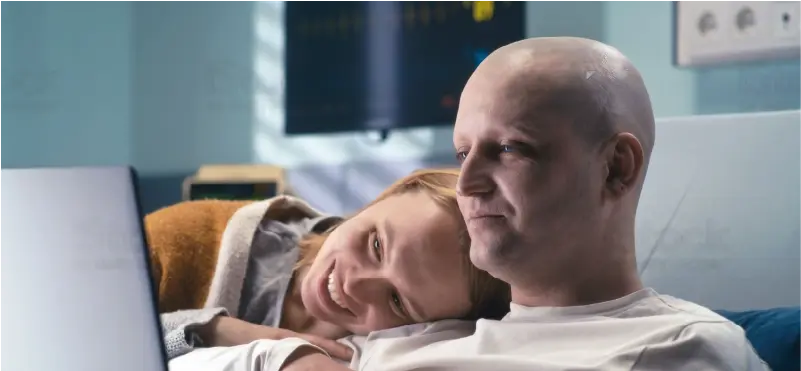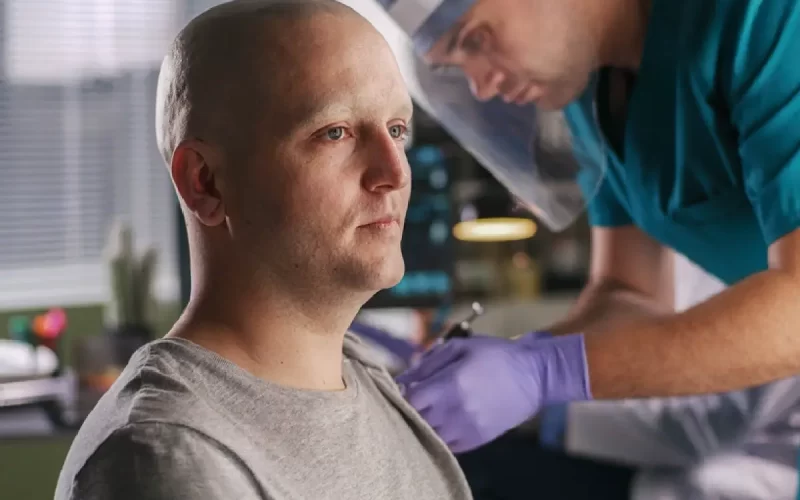Table of Contents Show
BEP chemotherapy is a combination of three drugs that are used to treat certain types of cancer, especially testicular cancer and ovarian germ cell tumors. The drugs are:
- Bleomycin (blee-o-my-sin), which damages the DNA of cancer cells and causes them to die.
- Etoposide (ee-top-o-side), which stops cancer cells from dividing and growing.
- Platinum (cisplatin) (sis-plat-in), which binds to the DNA of cancer cells and prevents them from repairing themselves.
BEP chemotherapy is given as a course of several cycles, each lasting 3 weeks. The number of cycles depends on the type and stage of the cancer, and how well it responds to the treatment. Each cycle involves having injections of the drugs into a vein (intravenously) on certain days. For example, one way of having BEP chemotherapy is:
- Day 1: etoposide, cisplatin, and bleomycin
- Day 2: etoposide and cisplatin
- Day 3: etoposide
- Day 8: bleomycin
- Day 15: bleomycin
It is used to treat some types of cancer, especially testicular cancer and ovarian germ cell tumors.
If you or someone you love is going through BEP chemotherapy, you might be wondering what to expect from this treatment. How effective is it? What are the side effects? How will it affect your long-term health?
In this article, we will answer these questions and more based on the latest research and real-life experiences of people who have undergone BEP chemotherapy.
BEP Chemotherapy Success Rate


BEP chemotherapy is one of the most effective treatments for testicular cancer, which is the most common cancer in men aged 15 to 35. According to a study by the National Cancer Institute, BEP chemotherapy can cure more than 90% of patients with advanced testicular cancer.
BEP chemotherapy can also be used to treat other types of cancer, such as ovarian cancer and germ cell tumors. However, the success rate may vary depending on the stage, type, and location of the cancer. Your doctor will be able to tell you more about your specific prognosis and treatment plan.
bep chemotherapy side effects


BEP chemotherapy can cause various side effects, both during and after the treatment. Some of the most common side effects are:
– Nausea and vomiting
– Loss of appetite and weight loss
– Hair loss
– Fatigue and weakness
– Low blood cell counts (anemia, neutropenia, thrombocytopenia)
– Increased risk of infection and bleeding
– Kidney damage
– Hearing loss or ringing in the ears (tinnitus)
– Nerve damage (neuropathy)
– Allergic reaction to bleomycin (fever, chills, rash, breathing problems)
Most of these side effects are temporary and can be managed with medications, fluids, nutrition, and supportive care. Your doctor will monitor your blood tests and vital signs regularly and adjust your dose or schedule if needed. You should also report any new or worsening symptoms to your doctor as soon as possible.
BEP Chemotherapy Long Term Effects
BEP chemotherapy can also have some long-term effects on your health, even after you finish the treatment. Some of the possible long-term effects are:
– Infertility or reduced fertility
– Lung damage or scarring (pulmonary fibrosis)
– Heart damage or failure (cardiotoxicity)
– Increased risk of developing another cancer (secondary malignancy)
– Psychological distress or depression
Not everyone who receives BEP chemotherapy will experience these long-term effects. The risk and severity of these effects depend on several factors, such as your age, gender, dose, duration, and overall health. Your doctor will follow up with you regularly and perform tests to check for any signs of these effects. You should also adopt a healthy lifestyle and avoid smoking, alcohol, and other risk factors.
How to Cope with BEP Chemotherapy Experience


BEP chemotherapy can be a challenging experience for both you and your loved ones. It can affect your physical, emotional, social, and financial well-being. However, there are ways to cope with this experience and improve your quality of life. Here are some tips:
- Educate yourself about your diagnosis, treatment, and prognosis. Ask your doctor any questions you have and seek reliable sources of information.
- Communicate with your family, friends, and health care team. Share your feelings, concerns, and needs with them. Seek support from people who understand what you are going through.
- Join a support group or online community for people with cancer. You can learn from others’ experiences, exchange tips and advice, and find comfort and encouragement.
- Take care of yourself physically and mentally. Eat well, stay hydrated, exercise moderately, get enough rest, and practice relaxation techniques. Seek professional help if you experience anxiety or depression.
- Focus on the positive aspects of your life. Celebrate your achievements, enjoy your hobbies, express your creativity, and appreciate your relationships.
- Plan for the future. Set realistic goals for yourself and work towards them. Look forward to the end of your treatment and the start of a new chapter in your life.
Recovery and Outcome
After completing BEP chemotherapy, I felt a mix of relief and anxiety. Relief because I had finished the hardest part of my treatment. Anxiety because I did not know if it had worked or not. I had to wait for a few weeks before having another round of blood tests and scans to check my response.
The results were good. My tumor markers had dropped significantly and there was no evidence of cancer in any other part of my body. I had achieved complete remission. This meant that all signs of cancer had disappeared after BEP chemotherapy. My doctor was very happy with my outcome and so was I.
I celebrated this news with my family and friends who had supported me throughout my journey. They were very proud of me and happy for me. They had seen me go through the worst and come out stronger. They had been there for me when I needed them the most. They had given me love, hope, and courage.
But my treatment was not over yet. I still had to do some follow-up care or treatment after BEP chemotherapy to make sure that the cancer did not come back. This included:
- Surveillance: regular check-ups with my doctor, including blood tests, scans, and physical exams.
- Surgery: removal of any remaining lymph nodes in my abdomen or chest that might contain cancer cells.
- Radiation: targeted beams of high-energy rays to kill any leftover cancer cells in a specific area of my body.
- Hormone therapy: pills or injections to replace the testosterone that I lost after the orchiectomy.
These were some of the options that my doctor discussed with me after BEP chemotherapy. The choice depended on my personal preferences, risks, and benefits. I decided to go for surveillance and hormone therapy, as they seemed to be the least invasive and most effective for me.
These were some of the factors that influenced the BEP chemotherapy success rate for me. According to the statistics, BEP chemotherapy has a high success rate for testicular cancer, especially if it is diagnosed and treated early. The survival rate for testicular cancer is over 95% after 5 years. This means that more than 95 out of 100 people with testicular cancer are alive 5 years after diagnosis.
Conclusion
BEP chemotherapy was one of the most challenging experiences of my life. It tested my physical and mental limits. It made me suffer and struggle. But it also made me survive and thrive. It taught me valuable lessons about life, health, and happiness. It gave me a new perspective and a new purpose.
Some of the positive aspects of my BEP chemotherapy experience were:
- I learned how to appreciate the small things in life, such as a sunny day, a good meal, or a warm hug.
- I learned how to cope with stress, pain, and uncertainty, using various strategies and resources.
- I learned how to be grateful for what I have, such as my health, my family, and my friends.
- I learned how to be optimistic about the future, believing that things will get better and that I will achieve my goals.
If you are facing BEP chemotherapy or have questions about it, I hope that my story has inspired you and helped you. You are not alone in this fight. You have many people who care about you and support you. You have many options and opportunities to overcome this challenge. You have many reasons and ways to live your life to the fullest.
Here are some tips or advice that I can give you based on my BEP chemotherapy experience:
- Do your research: learn as much as you can about BEP chemotherapy, its benefits and risks, its side effects and complications, its alternatives and outcomes.
- Ask questions: don’t be afraid to ask your doctor, nurse, pharmacist, or counselor anything that you want to know or understand about BEP chemotherapy.
- Be prepared: plan ahead for each cycle of BEP chemotherapy, such as what to bring, what to expect, what to do, and what to avoid.
- Be proactive: take charge of your health and well-being, such as by following your treatment plan, managing your side effects, monitoring your progress, and seeking help when needed.
- Be positive: focus on the bright side of your BEP chemotherapy experience, such as by celebrating your achievements, acknowledging your strengths, expressing your emotions, and enjoying your hobbies.
I would love to hear from you and answer any questions that you might have about BEP chemotherapy or my experience with it. Please leave a comment below or contact me through email or social media. Thank you for reading my article and I wish you all the best.
FAQs about BEP Chemotherapy Experience
Here are some frequently asked questions about BEP chemotherapy experience:
How long does BEP chemotherapy last?
The duration of BEP chemotherapy depends on the type and stage of your cancer. Typically, you will receive one cycle of BEP chemotherapy every three weeks for three or four cycles. Each cycle consists of five days of treatment followed by two weeks of rest.
Can I work or study during BEP chemotherapy?
It depends on how you feel and how your treatment affects you. Some people may be able to work or study part-time or from home during BEP chemotherapy. Others may need to take a break or reduce their workload. You should discuss this with your employer or school and make arrangements that suit you.
Can I have sex during BEP chemotherapy?
Yes, you can have sex during BEP chemotherapy if you feel well enough and have no signs of infection or bleeding. However, you should use contraception to prevent pregnancy or sexually transmitted infections (STIs). You should also avoid oral sex if you have mouth sores or low platelets.
Will I lose my hair during BEP chemotherapy?
Yes, most likely you will lose your hair during BEP chemotherapy. This can happen as early as two weeks after the first treatment. Your hair will grow back after you finish your treatment. Your hair may have a different texture, color, or style than before.
How can I prevent or reduce the side effects of BEP chemotherapy?
There are some things you can do to prevent or reduce the side effects of BEP chemotherapy, such as:
- Take anti-nausea medications as prescribed by your doctor before and after each treatment.
- Eat small, frequent, and bland meals. Avoid spicy, fatty, or acidic foods. Drink plenty of fluids.
- Use gentle shampoo and conditioner. Avoid hair products, heat, or styling tools. Wear a hat, scarf, or wig to protect your scalp.
- Take iron supplements or blood transfusions if you have anemia. Avoid activities that can cause injury or bleeding. Use a soft toothbrush and floss gently.
- Wash your hands often and avoid contact with people who are sick. Get vaccinated for flu and pneumonia. Call your doctor if you have a fever, cough, sore throat, or other signs of infection.
- Protect your kidneys by drinking plenty of water and avoiding alcohol, caffeine, and NSAIDs. Monitor your urine output and color. Report any changes to your doctor.
- Protect your ears by avoiding loud noises and wearing earplugs. Tell your doctor if you have any hearing problems or tinnitus.
- Protect your nerves by avoiding extreme temperatures and wearing gloves and socks. Tell your doctor if you have any numbness, tingling, pain, or weakness in your hands or feet.
How did you find out that you had testicular cancer?
I found out that I had testicular cancer when I noticed a lump in my left testicle. It was painless but hard and irregular. I went to see my doctor who examined me and ordered some blood tests and an ultrasound scan. The results confirmed that I had testicular cancer.
How did you tell your family and friends about your diagnosis?
I told my family and friends about my diagnosis as soon as possible. It was not easy but it was necessary. They were shocked and scared at first but they also showed me a lot of love and support. They helped me cope with the news and prepare for the treatment.
How did you deal with the loss of your testicle?
I dealt with the loss of my testicle by accepting it as part of my treatment. I knew that it was better to lose one testicle than to lose my life. I also knew that it would not affect my masculinity or sexuality. I opted for a prosthetic testicle to replace the missing one. It looked and felt natural and helped me regain my confidence and self-esteem.
How did you cope with the fear of recurrence?
I coped with the fear of recurrence by following my doctor’s advice and staying on top of my surveillance. I also tried to live a healthy and balanced lifestyle, such as by eating well, exercising regularly, quitting smoking, and reducing stress. I also sought professional help when I felt anxious or depressed. I learned how to cope with negative thoughts and emotions and focus on the positive ones.
How did BEP chemotherapy affect your relationships?
BEP chemotherapy affected my relationships in different ways. Some of them became stronger and deeper, such as with my parents, siblings, partner, and best friends. They were always there for me, supporting me, encouraging me, and comforting me. They made me feel loved and cared for. Some of them became weaker or distant, such as with some of my acquaintances, colleagues, or casual friends. They did not understand what I was going through or how to help me. They made me feel isolated and lonely.
How did you find meaning and purpose after BEP chemotherapy?
I found meaning and purpose after BEP chemotherapy by pursuing my passions and goals. I resumed my studies and career that I had put on hold during my treatment. I also explored new hobbies and interests that I had always wanted to try. I also volunteered for a cancer charity that helped other people who were facing BEP chemotherapy or had questions about it. I shared my story and experience with them and offered them support and advice.
How did you celebrate your survival anniversary?
I celebrated my survival anniversary by doing something special and meaningful for myself and my loved ones. For example, I went on a trip to a place that I had always wanted to visit, or I threw a party with my family and friends who had supported me throughout my journey. I also made a donation to a cancer research organization that was working on finding better treatments and cures for testicular cancer.





Comments 1
Comments are closed.